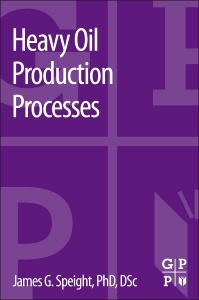Description
Heavy Oil Production Processes
Author: Speight James G.
Language: English
Subject for Heavy Oil Production Processes:
Keywords
heavy crude oil; gas; fluid; temperature; petroleum; shale reservoir
Approximative price 31.60 €
In Print (Delivery period: 14 days).
Add to cart180 p. · 15.2x22.8 cm · Paperback
Description
/li>Contents
/li>Readership
/li>Biography
/li>Comment
/li>
As conventional-oil resources are depleted worldwide, vast heavy oil reserves available in various parts of the world become increasingly important as a secure future energy source. Brief but readable, Heavy Oil Production Processes discusses the latest improvements in production processes including; thermal methods (steam floods, cyclic steam stimulation, SAGD) as well as non-thermal methods (cold flow with sand production, cyclic solvent process, VAPEX). The book begins with an overview of the chemistry, engineering, and technology of heavy oil as they evolve into the twenty-first century. The preceding chapters are written to provide a basic understanding of each technology, evolving processes and new processes as well as the various environmental regulations.
Clear and rigorous, Heavy Oil Production Processes will prove useful for those scientists and engineers already engaged in fossil fuel science and technology as well as scientists, non-scientists, engineers, and non-engineers who wish to gain a general overview or update of the science and technology of fossil fuels. The not only does the book discuss the production processes but also provides methods which should reduce environmental footprint and improve profitability.
- Overview of the chemistry, engineering, and technology of oil sands
- Updates on the evolving processes and new processes
- Evolving and new environmental regulations regarding oil sands production
- Evolution of Steam Injection Technologies
- Screening Criteria for Steamflood Technologies
- In Situ Combustion
Operations engineers, Production engineers, Geologists and Research and development engineers
Sources. He is recognized as a world leader in the areas of fuels characterization and development. Dr. Speight is also Adjunct Professor of Chemical and Fuels Engineering at the University of Utah.
James Speight is also a Consultant, Author and Lecturer on energy and environmental issues. He has a B.Sc. degree in Chemistry and a Ph.D. in Organic Chemistry, both from University of Manchester. James has worked for various corporations and research facilities including Exxon, Alberta Research Council and the University of Manchester. With more than 45 years of experience, he has authored more than 400 publications--including over 50 books--reports and presentations, taught more than 70 courses, and is the Editor on many journals including the Founding Editor of Petroleum Science and Technology.
- Overview of the chemistry, engineering, and technology of oil sands
- Updates on the evolving processes and new processes
- Evolving and new environmental regulations regarding oil sands production
These books may interest you

Oil Sand Production Processes 31.60 €

Shale Oil Production Processes 31.60 €


